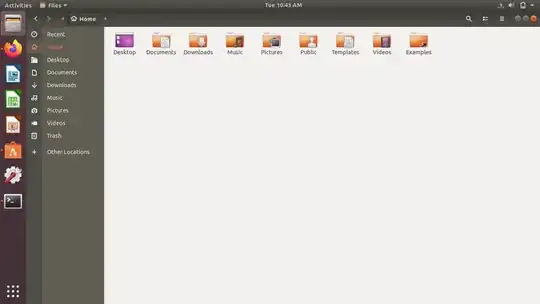After constantly facing issues with Windows 10 updates, I decided to switch over to Ubuntu 18.04 LTS as I am somewhat familiar with Ubuntu. However, after successful installation of Ubuntu 18.04 LTS, I am facing an issue regarding the detection of Seagate external HDD in Ubuntu.
After searching every forum and having tried everything they proposed (in particular this thread: Seagate 2T external hard drive can not be mounted, detected by lsusb but not by fdisk -l), I am still unable to get my HDD detected.
My terminal output of the commands given in the above mentioned thread are as below:
# lsusb
Bus 002 Device 002: ID 0bc2:ac2d Seagate RSS LLC
Bus 002 Device 001: ID 1d6b:0003 Linux Foundation 3.0 root hub
Bus 001 Device 003: ID 0bda:5520 Realtek Semiconductor Corp.
Bus 001 Device 002: ID 27c6:5301
Bus 001 Device 004: ID 0cf3:e009 Atheros Communications, Inc.
Bus 001 Device 001: ID 1d6b:0002 Linux Foundation 2.0 root hub
# sudo fdisk -l
Disk /dev/loop0: 2.5 MiB, 2621440 bytes, 5120 sectors
Units: sectors of 1 * 512 = 512 bytes
Sector size (logical/physical): 512 bytes / 512 bytes
I/O size (minimum/optimal): 512 bytes / 512 bytes
Disk /dev/loop1: 219 MiB, 229638144 bytes, 448512 sectors
Units: sectors of 1 * 512 = 512 bytes
Sector size (logical/physical): 512 bytes / 512 bytes
I/O size (minimum/optimal): 512 bytes / 512 bytes
Disk /dev/loop2: 704 KiB, 720896 bytes, 1408 sectors
Units: sectors of 1 * 512 = 512 bytes
Sector size (logical/physical): 512 bytes / 512 bytes
I/O size (minimum/optimal): 512 bytes / 512 bytes
Disk /dev/loop3: 4 KiB, 4096 bytes, 8 sectors
Units: sectors of 1 * 512 = 512 bytes
Sector size (logical/physical): 512 bytes / 512 bytes
I/O size (minimum/optimal): 512 bytes / 512 bytes
Disk /dev/loop4: 55.4 MiB, 58130432 bytes, 113536 sectors
Units: sectors of 1 * 512 = 512 bytes
Sector size (logical/physical): 512 bytes / 512 bytes
I/O size (minimum/optimal): 512 bytes / 512 bytes
Disk /dev/loop5: 295.7 MiB, 310079488 bytes, 605624 sectors
Units: sectors of 1 * 512 = 512 bytes
Sector size (logical/physical): 512 bytes / 512 bytes
I/O size (minimum/optimal): 512 bytes / 512 bytes
Disk /dev/loop6: 2.5 MiB, 2605056 bytes, 5088 sectors
Units: sectors of 1 * 512 = 512 bytes
Sector size (logical/physical): 512 bytes / 512 bytes
I/O size (minimum/optimal): 512 bytes / 512 bytes
Disk /dev/loop7: 65.2 MiB, 68378624 bytes, 133552 sectors
Units: sectors of 1 * 512 = 512 bytes
Sector size (logical/physical): 512 bytes / 512 bytes
I/O size (minimum/optimal): 512 bytes / 512 bytes
Disk /dev/sda: 931.5 GiB, 1000204886016 bytes, 1953525168 sectors
Units: sectors of 1 * 512 = 512 bytes
Sector size (logical/physical): 512 bytes / 4096 bytes
I/O size (minimum/optimal): 4096 bytes / 4096 bytes
Disklabel type: gpt
Disk identifier: 1DEA151D-2317-4862-809C-F2F528BD0614
Device Start End Sectors Size Type
/dev/sda1 2048 1050623 1048576 512M EFI System
/dev/sda2 1050624 2549759 1499136 732M Linux filesystem
/dev/sda3 2549760 1953523711 1950973952 930.3G Linux LVM
Disk /dev/mapper/ubuntu--vg-root: 929.3 GiB, 997871058944 bytes, 1948966912 sectors
Units: sectors of 1 * 512 = 512 bytes
Sector size (logical/physical): 512 bytes / 4096 bytes
I/O size (minimum/optimal): 4096 bytes / 4096 bytes
Disk /dev/mapper/ubuntu--vg-swap_1: 976 MiB, 1023410176 bytes, 1998848 sectors
Units: sectors of 1 * 512 = 512 bytes
Sector size (logical/physical): 512 bytes / 4096 bytes
I/O size (minimum/optimal): 4096 bytes / 4096 bytes
Disk /dev/loop8: 32.3 MiB, 33878016 bytes, 66168 sectors
Units: sectors of 1 * 512 = 512 bytes
Sector size (logical/physical): 512 bytes / 512 bytes
I/O size (minimum/optimal): 512 bytes / 512 bytes
Disk /dev/loop9: 242.4 MiB, 254115840 bytes, 496320 sectors
Units: sectors of 1 * 512 = 512 bytes
Sector size (logical/physical): 512 bytes / 512 bytes
I/O size (minimum/optimal): 512 bytes / 512 bytes
Disk /dev/loop10: 61.8 MiB, 64770048 bytes, 126504 sectors
Units: sectors of 1 * 512 = 512 bytes
Sector size (logical/physical): 512 bytes / 512 bytes
I/O size (minimum/optimal): 512 bytes / 512 bytes
Disk /dev/loop11: 548 KiB, 561152 bytes, 1096 sectors
Units: sectors of 1 * 512 = 512 bytes
Sector size (logical/physical): 512 bytes / 512 bytes
I/O size (minimum/optimal): 512 bytes / 512 bytes
Disk /dev/loop12: 248.6 MiB, 260681728 bytes, 509144 sectors
Units: sectors of 1 * 512 = 512 bytes
Sector size (logical/physical): 512 bytes / 512 bytes
I/O size (minimum/optimal): 512 bytes / 512 bytes
# dmesg | tail
[ 4457.505360] CPU1: Package temperature above threshold, cpu clock throttled (total events = 2817)
[ 4457.505361] CPU3: Package temperature above threshold, cpu clock throttled (total events = 2817)
[ 4457.506443] CPU6: Package temperature/speed normal
[ 4457.506443] CPU0: Package temperature/speed normal
[ 4457.506444] CPU2: Package temperature/speed normal
[ 4457.506445] CPU4: Package temperature/speed normal
[ 4457.506485] CPU1: Package temperature/speed normal
[ 4457.506485] CPU5: Package temperature/speed normal
[ 4457.506486] CPU7: Package temperature/speed normal
[ 4457.506487] CPU3: Package temperature/speed normal
# sudo apt install exfat-fuse exfat-utils
Reading package lists... Done
Building dependency tree
Reading state information... Done
exfat-fuse is already the newest version (1.2.8-1).
exfat-utils is already the newest version (1.2.8-1).
0 upgraded, 0 newly installed, 0 to remove and 0 not upgraded.
Here is a screenshot of my Files window:
I am unable to see my HDD. Please help.
